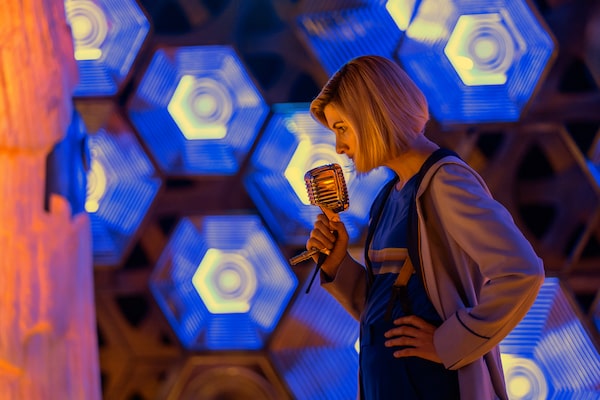
Jodie Whittaker said the first female Doctor Who is 'something to be celebrated, and the next person to play the role will be an actor, not a man or a woman.'James Pardon/Bell
In the first episode of the 2018 season of the British sci-fi series Doctor Who, a gruesome, unprincipled blue-faced dude is weirded out by his female adversary. Puzzled by her wits, gumption and sense of decency, he is helpless but to ask, “Who are you?”
Good question – she’d been confused about her identity herself. But thanks to a “bit of adrenaline, a dash of outrage and a hint of panic,” she’d now figured it out. “I know exactly who I am,” she says. “I’m the Doctor, sorting out fair play throughout the universe. Now, please, get off this planet while you still have a choice.”
A civilization-saving heroine finding herself and calling out a monster for his crude immorality. Isn’t that timely?
Before viewing this episode last fall, Doctor Who always came with a question mark for me. The show has been around off and on since the year I’d been born – 1963 – but it’s never been my jazz. It seemed campy, geeky and cheaply produced, either beloved by nerds or watched ironically.
But, because season 11 of the show’s third incarnation would feature a female lead character for the first time in the BBC franchise’s history, I was assigned to write a story on the actress playing the iconic character. She’s Jodie Whittaker, the first woman Doctor Who, after a dozen blokes. A glass-ceiling smasher, her first episode was The Woman Who Fell to Earth.
“Why are you calling me ‘Madame,’ ” she asks straight off, after her fall to this planet. When told she is a woman, the new Doctor Who, wearing her male predecessor’s clothing, is surprised. “Am I? Does it suit me?”
It does.
Whittaker’s Doctor Who is quirky, effervescent and ingenious. And, of course, there’s that wacky English accent. Is she better than her male predecessors? Don’t know; don’t care. She’s marvellous. The Doctor Who character herself, I learn, is not human, but an alien. Is she ever. And all the better.

When asked if anything was different this year from seasons’ past, Whittaker replied, 'It’s on Sundays.'James Pardon/Bell
The actress Whittaker arrived in Toronto last fall for an interview with The Globe and Mail. Explaining that I’d never seen a complete episode of the show prior to watching this season’s premiere, I asked her if anything was different this year from seasons’ past. “It’s on Sundays,” she said, with a hint of mischief. “That’s the only change I can think of.”
Asked why it took so long for a female Doctor Who, Whittaker said it wasn’t her question to answer. “I have no idea,” replied the 37-year-old West Yorkshire native. “But I think it’s something to be celebrated, and the next person to play the role will be an actor, not a man or a woman.”
The show’s writers dropped in allusions to the gender change in the first episode, cheekily assuaging alienated fans: “All of this is new, and new can be scary,” says the Doctor, calming down a train full of shocked passengers. And later: “We’re all capable of the most incredible change,” she says. “We can evolve while still staying true to who we are. We can honour who we’ve been and choose who we want to be next.”
More recently than my chat with the female Doctor Who, I’ve been bingeing on the FX series Fargo. Inspired by the eponymous 1996 Coen brothers' film, the blackly comic crime drama has a complicated relationship with feminism. Season one and three feature gifted female law enforcement officers obstructed by male superiors who are either incapable or pig-headed (or both).
Set in 1979, Season two is trickier. Kirsten Dunst’s character, bent on “self-actualization” and chafing at her prescribed role as wife and future mother, is presented as being mentally unstable. On the other hand, a younger woman tells her father to “kiss my grits” – a women’s lib pop-culture reference – and that girl’s grandmother vouches for female empowerment. “This is our time,” says a crime-family’s matriarch. “No such thing as men’s work and women’s work any more.”
Which is just what the Doctor Who ordered. When actor Peter Capaldi left the show in 2017, a small list of actresses only were tested to replace him. After what Whittaker described as a “gruelling” audition process, she won the right to wield the show’s sonic screwdriver.
“It’s another step forward,” said the actress, who made her professional debut in The Storm at Shakespeare's Globe theatre in 2005. “We are the other half of the population. We have a voice that should be heard as equally as a man’s.”
Indeed, which is why I asked the actress if she’d audition for a new role at the end of our interview. “Just three words,” I told her. “Bond. Jane Bond.”
She didn’t bite. “Right, you’re not going to get that out of me,” she said, standing up with a laugh. “I guess I don’t get the part.”
With that, a smirking Whittaker was gone, publicists and handlers trailing behind. Doctor Who had smacked me down with a little Dr. No – a first-rate performance.
Doctor Who’s Season 11 is available now on DVD and Blue-ray; streaming on Crave in June.
 Brad Wheeler
Brad Wheeler